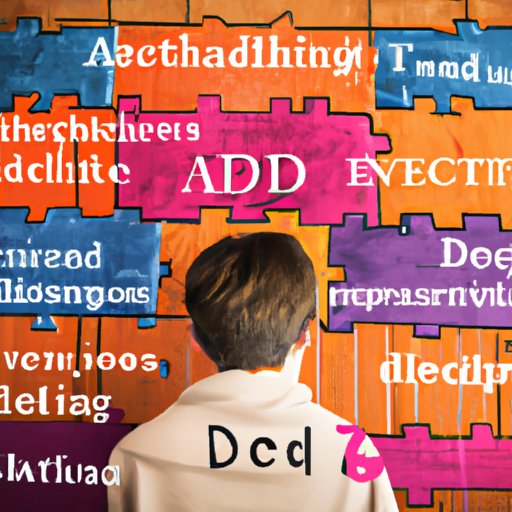Introduction
Attention Deficit Hyperactivity Disorder (ADHD) is a neurodevelopmental disorder that affects people of all ages. It is characterized by difficulties with concentration, impulsivity, and hyperactivity. This article will explore how does ADHD work, including looking at its causes, symptoms, diagnosis, treatment options, impact on everyday life, and role of genetics.
Exploring the Causes and Symptoms of ADHD
The exact cause of ADHD is still unknown, however it is thought to be related to both biological and environmental factors. Biological factors such as genetics, brain structure, and neurotransmitter imbalances can contribute to the development of the condition. Environmental factors such as exposure to toxins, stress, and trauma may also play a role in the onset of ADHD.
Common symptoms of ADHD include difficulty concentrating, impulsivity, and hyperactivity. Those with ADHD may have trouble staying focused on tasks and may be prone to making impulsive decisions. They may also display signs of hyperactivity, such as fidgeting or talking excessively.

Examining the Impact of ADHD on Everyday Life
ADHD can have a significant impact on everyday life, affecting both the individual and those around them. Those with ADHD may find it difficult to concentrate, leading to problems with completing tasks and paying attention to detail. In social situations, they may have difficulty controlling their impulses, resulting in inappropriate behavior.
ADHD can also have a negative effect on school performance. Those with ADHD may struggle to stay focused in class, which can lead to poor grades and difficulty keeping up with course material. Additionally, they may have difficulty following instructions and maintaining relationships with teachers and peers.

Understanding How ADHD is Diagnosed
ADHD is typically diagnosed by a medical professional, such as a doctor or psychologist. During an evaluation, the doctor will assess the individual’s symptoms and take into account any information provided by family members or teachers. They may also administer tests to measure the individual’s level of attention, concentration, and impulsivity.
In addition to evaluating the individual’s symptoms, the doctor will also rule out other conditions that could be causing similar symptoms. These can include learning disabilities, depression, anxiety, and sleep disorders.
Exploring Treatment Options for ADHD
Treatment for ADHD typically involves a combination of medication, behavioral therapy, and lifestyle changes. Medication such as stimulants or non-stimulants can help improve concentration and reduce impulsivity. Behavioral therapy can help individuals learn strategies to manage their symptoms and improve social skills.
Making lifestyle changes such as eating a balanced diet, getting regular exercise, and getting enough sleep can also help manage the symptoms of ADHD. Additionally, establishing a routine and creating an organized environment can help individuals stay focused and on task.

Investigating the Link Between ADHD and Education
ADHD can have a significant impact on education. Those with ADHD may struggle to stay focused in the classroom, leading to difficulty understanding and retaining course material. Additionally, they may have difficulty following instructions and maintaining relationships with teachers and peers.
To help those with ADHD succeed in the classroom, schools may provide accommodations or support services. These can include shorter assignments, extended time on tests, and extra one-on-one help from teachers. Additionally, schools may provide counseling or behavioral therapy to help those with ADHD develop strategies to manage their symptoms.
Examining the Role of Genetics in ADHD
Genetics play an important role in the development of ADHD. Studies show that the disorder is highly heritable, meaning that it tends to run in families. Twin studies have also found that if one twin has ADHD, the other is more likely to have it as well.
Other genetic factors such as gene mutations, genetic variations, and epigenetic modifications may also play a role in the development of ADHD. Research is ongoing to better understand the role of genetics in the disorder.
Conclusion
This article explored how does ADHD work, including looking at its causes, symptoms, diagnosis, treatment options, impact on everyday life, and role of genetics. While the exact cause of ADHD is still unknown, research suggests that it is related to a combination of biological and environmental factors. Treatment typically involves a combination of medication, behavioral therapy, and lifestyle changes. Schools may also provide accommodations or support services to help those with ADHD succeed in the classroom.
If you think you or a loved one may have ADHD, it is important to speak to a medical professional. They will be able to evaluate your symptoms and recommend treatment options that are right for you.
For more information on ADHD, please visit the websites of organizations such as the National Institute of Mental Health, the American Academy of Pediatrics, and the Centers for Disease Control and Prevention.
(Note: Is this article not meeting your expectations? Do you have knowledge or insights to share? Unlock new opportunities and expand your reach by joining our authors team. Click Registration to join us and share your expertise with our readers.)
